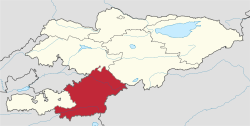Osh Region
Osh Region
| |
|---|---|
Region | |
From the top, View of Osh on Sulayman Mountain, Sulayman-Too Mosque in Osh, National Historical and Archaeological Museum Complex | |
 Map of Kyrgyzstan, location of Osh Region highlighted | |
| Coordinates: 40°0′N 73°0′E / 40.000°N 73.000°E | |
| Country | |
| Capital | Osh |
| Government | |
| • Governor | Taalaibek Sarybashev |
| Area | |
| • Total | 28,934 km2 (11,171 sq mi) |
| Population (2023-01-01)[1] | |
| • Total | 1,460,425 |
| • Density | 50/km2 (130/sq mi) |
| Time zone | UTC+6 (KGT) |
| ISO 3166 code | KG-O |
| Districts | 7 |
| Cities | 3 |
| Villages | 474 |
Osh Region[a] is a region of Kyrgyzstan. Its capital is Osh, which is not part of the region.[2] It is bounded (clockwise) by Jalal-Abad Region, Naryn Region, China (Xinjiang), Tajikistan (Districts under Central Government Jurisdiction and Gorno-Badakhshan Autonomous Region), Batken Region, and Uzbekistan (Andijan and Fergana Regions). Its total area is 28,934 km2 (11,171 sq mi).[3] The resident population of the region was 1,391,649 as of January 2021.[1] The region has a sizeable Uzbek (28.0% in 2009) minority.[3]
Geography
[edit]Most of the population lives in the flat northern part of the Oblast, on the edge of the Ferghana Valley. The land gradually rises southward to the crest of the Alay Mountains, drops into the Alay Valley and rises to the Trans-Alai Range which forms the border with Tajikistan. In the east, the land rises to the Ferghana Range, roughly parallel to the Naryn border. This area is drained by the Kara Darya which flows northwest to join the Naryn to form the Syr Darya in the Ferghana Valley.
Highway M41 goes south over the mountains from Osh to the Tajik border. At Sary-Tash a branch goes east to the Chinese border crossing at Irkeshtam. The other main road goes west through the flat country to Batken Region.
Divisions
[edit]The Osh Region is divided administratively into seven districts:[2]
| District | Seat | Map |
|---|---|---|
| Alay District | Gülchö | 
|
| Aravan District | Aravan | 
|
| Chong-Alay District | Daroot-Korgon | 
|
| Kara-Kulja District | Kara-Kulja | 
|
| Kara-Suu District | Kara-Suu | 
|
| Nookat District | Nookat | 
|
| Özgön District | Özgön | 
|
Kara-Suu, Nookat and Özgön are cities of district significance. There are no urban-type settlements in the region.[2]
Demographics
[edit]The resident population of Osh Region, according to the Population and Housing Census of 2009, was 1,104,248. Of these, 87,824 people live in urban areas, and 1,016,424 in rural ones.[3] The official population estimate for the beginning of 2021 was 1,391,649.[1]
| Year | Pop. | ±% |
|---|---|---|
| 1970 | 433,029 | — |
| 1979 | 554,480 | +28.0% |
| 1989 | 712,643 | +28.5% |
| 1999 | 943,566 | +32.4% |
| 2009 | 1,104,248 | +17.0% |
| 2021 | 1,391,649 | +26.0% |
| Note: resident population; Sources:[3][1] | ||
Ethnic composition
[edit]The largest ethnic minority group in Osh Region is Uzbeks, forming 28% of the regional population (308,688 people) according to the 2009 census.[3] In 2009, 40% of all Kyrgyzstan's Uzbeks lived in Osh Region.[4] According to the 2009 Census, the ethnic composition of the Osh Region (resident population) was:[3]
| Ethnic group | Population | Proportion of population |
|---|---|---|
| Kyrgyzs | 758,036 | 68.6% |
| Uzbeks | 308,688 | 28.0% |
| Uygurs | 11,181 | 1.0% |
| Turks | 10,934 | 1.0% |
| Tajiks | 6,711 | 0.6% |
| Azerbaijanis | 3,224 | 0.3% |
| Russians | 1,552 | 0.1% |
| Tatars | 1,337 | 0.1% |
| Dungans | 793 | 0.1% |
| other groups | 1,792 | 0.2% |
Enclaves and exclaves
[edit]Kyrgyzstan's only exclave within Uzbekistan is administratively part of Osh Region (Kara-Suu District). This is the tiny village of Barak (population 627) in the Fergana valley, located on the road from Osh (Kyrgyzstan) to Xoʻjaobod (Uzbekistan) about 4 km north-west from the Kyrgyz–Uzbek border in the direction of Andijan.[5]
References
[edit]Notes
[edit]- ^
- Kyrgyz: Ош облусу, romanized: Osh oblusu, IPA: [ɔ́ɕ ɔ́b̥ɫʊsʊ́]
- Russian: Ошская область, romanized: Ošskaja oblastj, IPA: [ˈoʂskəjə ˈobɫəsʲtʲ]
- Uzbek: Ўш вилояти, romanized: Oʻsh viloyati, IPA: [ˈɵʃ ʋɪlɒjæˈtʰɪ]
Citations
[edit]- ^ a b c d "Population of regions, districts, towns, urban-type settlements, rural communities and villages of Kyrgyz Republic" (XLS) (in Russian). National Statistics Committee of the Kyrgyz Republic. 2021. Archived from the original on 10 November 2021.
- ^ a b c "Classification system of territorial units of the Kyrgyz Republic" (in Kyrgyz). National Statistics Committee of the Kyrgyz Republic. May 2021. pp. 46–63.
- ^ a b c d e f "2009 population and housing census of the Kyrgyz Republic: Osh Region" (PDF) (in Russian). National Statistics Committee of the Kyrgyz Republic. 2010. pp. 12, 17, 51, 186.
- ^ Population and Housing Census 2009. Chapter 3.1. Resident population by nationality (PDF) (in Russian), Bishkek: National Committee on Statistics, 2010, retrieved 2021-12-15
- ^ Map showing the location of the Kyrgyz exclave Barak. Retrieved on 2 May 2009.
Sources
[edit]- Laurence Mitchell, Kyrgyzstan, Bradt Travel Guides, 2008





